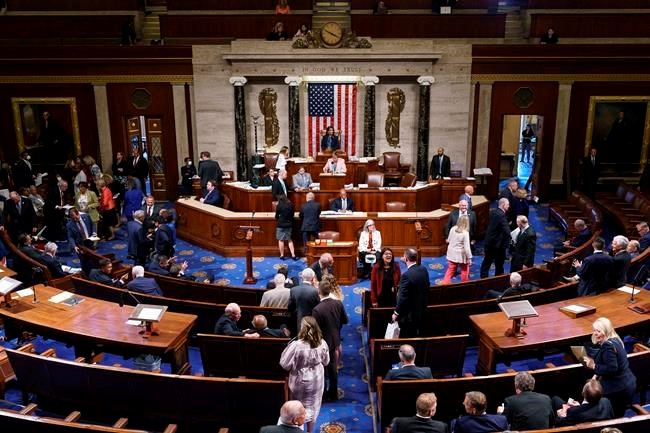WASHINGTON — It's conventional political wisdom that's as old as the hills in the United States: the party that controls the White House seldom does well in the midterms.
But Glenn Youngkin's convincing Republican win in November's gubernatorial contest in Virginia, paired with his party's stronger-than-expected showing in New Jersey, has some Democrats on Capitol Hill all but manning the lifeboats in advance of the 2022 elections.
And some observers are even wondering whether Joe Biden, who hasn't even spent a full year as president yet, has become a serious liability.
"Even if this were a typical midterm election cycle, we would expect the Republicans to pick up a significant number of seats in Congress," said Mark Rozell, a political-science professor at George Mason University in Arlington, Va., just across the river from Washington, D.C.
"But because of the perception — even if unfairly — that the Biden administration has repeatedly stumbled, the Republicans right now are very strongly positioned to do well next year. It's going to be a tough second half of the term for the Biden administration, for sure."
That second half doesn't begin until 2023, of course, which is why it's likely that the White House will be redoubling its efforts next year to press ahead with its legislative agenda — an effort that made a striking amount of progress in 2021, public opinion polls notwithstanding, given a stalemate Senate.
Biden notched two significant victories, a $1.9-trillion pandemic relief bill and a $1.2-trillion infrastructure package, before his contentious $1.75-trillion Build Back Better climate and social spending centrepiece faltered late in the year, largely at the hands of Sen. Joe Manchin, the moderate Democrat from West Virginia.
Despite that, however, Biden's approval ratings remain underwater — a likely consequence, experts say, of public frustration with the persistence of the COVID-19 pandemic, and an illustration of the political challenges inherent in trying to govern during times of domestic crisis.
"Some of this is an inability — and I'm not sure if any other administration could do it any better — but an inability to communicate at a really individual level about how people's lives are better because the Democrats are in Washington right now," said Jennifer Lawless, a professor of politics at the University of Virginia in Charlottesville.
A barrage of negative news, from the pandemic and the chaotic pullout from Afghanistan to supply chain challenges and the march of inflation, has exhausted an American population that is already deeply embedded in a climate of political polarization, Lawless said.
It's a supercharged version of governing in a recession, when even significant political victories do little to distract voters from the existential challenges they face in their daily lives. And it could lead to an unlikely spectacle in 2024: an incumbent president facing a primary challenge while past and future rival Donald Trump coasts to his own nomination.
"The pandemic is even more complicated than just a bad economic year, because almost any move that you make alienates and isolates the opposition, which then causes further attention to the moves you've made," Lawless said.
Two perfect examples: vaccine and mask mandates, both of which have served to further divide an already deeply divided country.
"The kinds of things that would go toward ending the pandemic have become so politicized that it's difficult for there not to be winners and losers — even when there's a public health decision that in real life you would think is just a win."
At the moment, some Canadians might be thinking a power shift on Capitol Hill wouldn't be a bad thing.
The Build Back Better bill is where the Biden administration has nestled a controversial incentive plan aimed at encouraging U.S. consumers and auto manufacturers alike to build and buy American-assembled electric vehicles, especially those made with union labour.
Canada has warned the tax-credit scheme would kneecap its own auto sector, and has threatened to launch a barrage of retaliatory tariffs and even suspend key elements of the U.S.-Mexico-Canada Agreement if the proposal — near and dear though it is to the president's heart — gets passed as is.
The Senate, which for now remains evenly divided between Republicans and Democrats, effectively abandoned an ambitious effort to get the bill passed before the holidays, and Biden didn't sound optimistic last week that it would be back on the front burner any time soon.
"It takes time to finalize these agreements, prepare the legislative changes, and finish all the parliamentary and procedural steps needed to enable a Senate vote," work that will proceed over "the days and weeks ahead," Biden said in a statement Thursday.
"At the same time, we must also press forward on voting rights legislation, and make progress on this as quickly as possible. I had a productive conversation today with several Senators about how we can get this vital legislation passed. Our democracy is at stake."
Ah yes, voting rights: long-promised legislation designed to forestall what critics say are Republican efforts at the state level to disenfranchise poor and minority voters, gerrymander the electoral map and launch vexatious efforts to cast doubt on election results.
It's an existential threat to Democrats, for obvious reasons — one that looms ever larger as the 2024 presidential election, in which the former commander-in-chief is widely expected to play his familiar outsized role, draws near.
"I think voting rights wind up getting right to the top of the list for next year," Lawless said. "These maps don't help the Democrats, and voter suppression plus bad maps guarantees the seat (to the Republicans)."
This report by The Canadian Press was first published Dec. 20, 2021.
James McCarten, The Canadian Press



